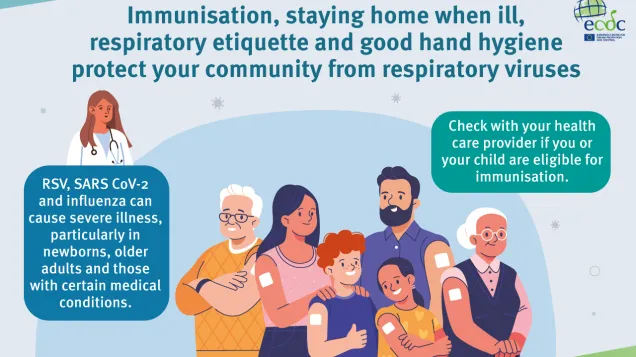ECDC urges immunisation and other measures as Europe enters respiratory virus season
Respiratory infections spread in the community, but they can also circulate in hospitals, general practices, and other medical settings.” says Bruno Ciancio, ECDC Senior Epidemiologist. “Immunising healthcare workers and groups at higher risk of severe disease, as well as applying meticulous infection prevention measures in healthcare settings can save thousands of lives. Even if you are not among the groups recommended for vaccination, you can help protect others by staying home and avoiding being in close contact with others when you have symptoms of a respiratory infection.”
Every winter, influenza epidemics cause millions of infections across Europe, leading to hundreds of thousands of hospitalisations and tens of thousands of deaths. Yet, influenza vaccination coverage rates remain below the 75% target level across Europe, both for vulnerable groups and healthcare workers. During the last season, most countries reported influenza vaccination coverage well below 50%. Only Denmark (76%), Ireland (75%), Portugal (71%) and Sweden (68%) reached or approached the 75% EU coverage target. Among healthcare workers, this level was even lower, with a median of 32%.
Children are particularly affected by influenza. Vaccinating children, in line with national recommendations, protects them from severe infections, particularly among those younger than five years of age. Most EU/EEA Member States recommend the influenza vaccine for children.
Across Europe, RSV leads to an estimated 250 000 hospitalisations in children and 160 000 hospitalisations in older adults each year. Several EU countries are implementing vaccination programmes for RSV in pregnant women and older adults, ensuring protection against severe disease. Other options such aslong-acting monoclonal antibodies1 are also available for groups at high risk of severe outcomes, like newborns
As SARS-CoV-2 continues to circulate year-round, with cases periodically rising, older adults, people with chronic conditions, and those with weakened immune systems remain at risk of severe illness and are recommended vaccination.
Pneumococcal pneumonia causes one of the highest rates of hospitalisations and mortality among older individuals. Yet, according to ECDC data, more than 70% of individuals 65 years old and above had an infection preventable by vaccination.
In addition to vaccination, good hygiene and respiratory etiquette help limit the spread of viruses. Regular handwashing, covering your mouth and nose when sneezing, staying at home when sick and ventilating closed spaces all reduce transmission.
Pregnant women, older adults, people with chronic conditions, and parents of newborns and children younger than five years of age are encouraged to speak with their healthcare provider about how to protect themselves against RSV, influenza, and COVID-19.
For patients at increased risk of severe illness, clinicians should consider early use of antiviral treatments for influenza to reduce the likelihood of disease progression according to national clinical guidelines. Healthcare workers are also strongly encouraged to stay up to date with vaccinations to protect their patients and themselves, and to help keep health systems functioning during the winter months.
1Monoclonal antibodies are laboratory-made proteins that mimic the body’s natural immune defences. They are designed to target specific viruses, bacteria, or harmful substances, helping the immune system block infection or reduce the severity of disease.
Share this page






